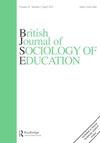投资儿子或女儿?中国农村父母的教育愿望
IF 2.1
3区 教育学
Q1 EDUCATION & EDUCATIONAL RESEARCH
引用次数: 0
摘要
摘要基于第一波中国教育小组调查,本研究旨在检验“重男轻女”和“精英主义”两种竞争机制对父母子女教育期望和投资的影响。这篇文章介绍了农村男孩和女孩学习成绩的总体写照。研究结果描述了父母投资的一般模式:父母更有可能在女儿身上投资,而不是儿子,父亲对女儿的教育期望更高。兄弟姐妹数量和“是否有兄弟”对父母教育期望和投资的影响在农村男孩和女孩中是相似的。父亲的教育期望主要基于孩子的学习成绩(精英主义),而母亲的教育期望与孩子的性别关系更密切。重男轻女作为一种文化特征在农村地区仍然具有影响力,尽管它不像以前那么强大,而且一种平等主义的趋势正在出现。关键词:性别农村女孩求学愿望学业成就父母投资中国披露声明作者未报告潜在的利益冲突。注1本研究中大多数孩子有兄弟姐妹的原因是独生子女政策在城市和农村实施的不同。在中国的城市,该政策得到了更严格的执行,而在中国的农村,该政策自20世纪80年代中期以来一直在修订。如果农村夫妇的第一个孩子是女孩,他们将被允许在5年后再生一个孩子。如果第一个孩子是男孩,他们将不允许再生一个孩子。本文章由计算机程序翻译,如有差异,请以英文原文为准。
Investing in sons or daughters? The educational aspirations of rural parents in China
AbstractBased on the first wave of the China Education Panel Survey, this study aims to test two competing mechanisms including son preference and meritocracy of leading to parents’ expectations of and investment in their children’s education. This article presents a general portrayal of academic performance among rural boys and girls. The findings depict a general pattern of parents’ investment: parents are more likely to invest in their daughters than sons, and fathers have a higher educational expectation of daughters. The influence of sibling numbers and ‘having a brother(s) or not’ on parents’ educational expectations and investment is similar for rural boys and girls. Fathers’ educational expectations are mainly based on the academic performance of their children (meritocracy) while mothers’ are more closely related to children’s gender. Son preference as a cultural characteristic remains influential in rural regions, although it is not as powerful as before and a trend towards egalitarianism is emerging.Keywords: Genderrural girlseducational aspirationsacademic achievementparental investmentChina Disclosure statementNo potential conflict of interest was reported by the author(s).Notes1 The reason that most children in this study have siblings because one child policy was implemented differently in the urban and rural settings. In urban China, the policy was more strictly enforced, while in rural China, the policy has been revised since mid-1980s. If rural couple have the first child is a girl, they would be allowed to have another baby after 5 years. If the first child is a boy, they would be not allowed to have another baby.
求助全文
通过发布文献求助,成功后即可免费获取论文全文。
去求助
来源期刊
CiteScore
3.70
自引率
9.50%
发文量
74
期刊介绍:
British Journal of Sociology of Education is one of the most renowned international scholarly journals in the field. The journal publishes high quality original, theoretically informed analyses of the relationship between education and society, and has an outstanding record of addressing major global debates about the social significance and impact of educational policy, provision, processes and practice in many countries around the world. The journal engages with a diverse range of contemporary and emergent social theories along with a wide range of methodological approaches. Articles investigate the discursive politics of education, social stratification and mobility, the social dimensions of all aspects of pedagogy and the curriculum, and the experiences of all those involved, from the most privileged to the most disadvantaged. The vitality of the journal is sustained by its commitment to offer independent, critical evaluations of the ways in which education interfaces with local, national, regional and global developments, contexts and agendas in all phases of formal and informal education. Contributions are expected to take into account the wide international readership of British Journal of Sociology of Education, and exhibit knowledge of previously published articles in the field. Submissions should be well located within sociological theory, and should not only be rigorous and reflexive methodologically, but also offer original insights to educational problems and or perspectives.

 求助内容:
求助内容: 应助结果提醒方式:
应助结果提醒方式:


